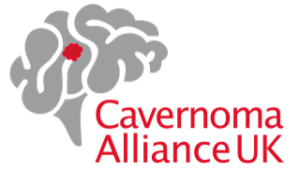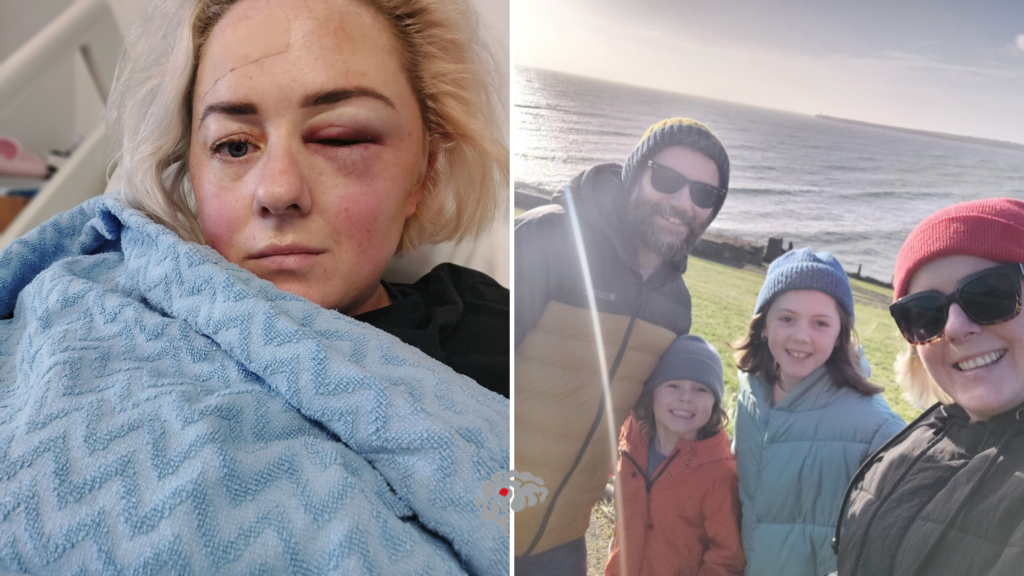My Cavernoma Diagnosis
My name is Jac Sinnott and I’m 39 years old. My cavernoma was located near my thalamus. I was diagnosed in July 2021 after hospitalisation following a bleed. I presented myself to the hospital with persistent symptoms which a couple of different GP practices said were migraines. Initially, my local hospital didn’t know what was causing my symptoms and it took a long time to get answers, especially as we were still in lockdown due to the pandemic.
My most recent symptoms appeared in late June 2021 and they presented as pins and needles down my left side as well as weakness and numbness on that side. I also had visual disturbances. Each episode would last for 30 minutes to an hour.
In retrospect I then started to realise there were other events in previous years which could be put down to the cavernoma. As far back as 2009, I had a few instances of vision loss for up to an hour, fainting episodes and blurred vision – at the time these were all classed as ocular migraines and no problems could be found with my vision. No neurological investigations ever happened until 2021. I attended 2 different hospitals before I was eventually seen by Professor Javadpour in Beaumont Hospital, who was the one to diagnose cavernoma and prescribed Keppra right away.
The surgery decision
It was decided that they would adopt a “watch and wait” approach and at the time I was happy with this given the risks of surgery, which they said could be complete disability of my left side, and blindness. However I was again hospitalised in November 2021 following another bleed. This time, it was decided that I would be transferred to Beaumont by ambulance as soon as a bed was available. Again, the health system was in crisis due to covid and as I sat waiting for a further 10 days, I discharged myself to go home to my family. The ward I was on now had covid in it and Beaumont had the highest number of cases in Ireland at that time.
I really wanted the surgery to happen at this point as it was clear my symptoms were worsening and the cavernoma was wreaking havoc on my day to day life. At 4.5cm x 3cm, it was sizeable and it was resting on my optic nerve and also causing motor & sensory issues. During that hospital stay my eyesight deteriorated further which is what prompted me to decide to have the surgery. The damage was done but I wanted to limit any further damage.
Once I had discharged myself I then had to be an advocate for my health. I spent months and months chasing the hospital to follow up on my care and to commit to a date for my surgery. Many times I was advised that there were patients worse off than me who were on waiting lists for up to 2 years. It was incredibly difficult to be in this fight or flight stage waiting for another episode to happen or indeed a catastrophic event to take place. All of this whilst still making daily phone calls, effectively begging for a place on the waiting list. My medication dosage had been increased twice without me ever having seen my team in person.
Almost exactly a year after my first hospitalisation, I had a brief loss of consciousness while driving and totalled my car. Again my medication was increased as the consultant suspected the loss was an absence seizure. My symptoms were worsening again, and increasing with still no date for surgery decided.
I ended up telling my story on local and national radio and a couple of weeks later my surgery was booked for November 2022.
Under the knife
It had taken me so long and I had practically fought for the surgery to happen, I had never even given any real thought to the surgery itself. I went into Beaumont the evening before surgery and was expecting to be brought to the theatre around midday the next day. My surgeon came around early the next morning and informed me I would be first up, within the hour. This was a blessing as I had no time to be scared or nervous about the impending brain surgery!
My team were all incredibly nice and I was looked after so well. I was given every reassurance beforehand and as they were prepping me, that this was the best decision for me and My surgeon was confident he could get the whole ‘raspberry’ out. They explained a little bit about where the incision would be – just to the front of my ear and along the top right they would peel my scalp forward to access the area. It was quite deep and the surgery I believe took a total of around 6 hours.
Coming round
I remember nothing of the hours after surgery but I have been told I was making jokes in the recovery room. I was in the high dependency unit for around 12 hours and then moved to a ward. I was quite groggy and sleepy but found it difficult to sleep with the incision and the catheter was very irritating. Pain was manageable by staying on top of the meds. My face and eyes were quite swollen and tender for at least a week or two.
The recovery process for me is still ongoing almost 7 months later. I had my surgery in winter which really allowed me to stay home and get a lot of rest. Fatigue is absolutely the hardest part of a brain condition and surgery. It is unrelenting in the initial recovery days and very hard to predict. It was very hard to be around more than a couple of people at a time. I was, and still am, prone to sensory overload and being overstimulated if there is too much competing noise. This is something that I manage now with ear plugs and taking myself to a quiet place if I need space. I still regularly need a nap in the afternoon or else my body and brain go into complete shut down. I am used to doing this now but it was quite hard to accept not being able to do the same things I once was. Now I don’t try to accept it, rather I acknowledge it and how I’m feeling too.
My advice for anything preparing for cavernoma surgery
Try to get yourself and your loved ones prepared for the realities of the days after surgery. If you have children (mine were 8 and 5 when I had surgery) talk to them about what is happening. Explain that you won’t be available to be with them as much as you usually are and how important it is for you to rest. Delegate as much as possible like school run etc and make sure there is always someone looking after you once you get home i.e. bringing meals and meds, and being there as a shoulder to cry on.
I was completely unprepared for the hugely emotional upheaval of the surgery, and probably from being in a state of limbo for 2 years. I cried a lot, with gratitude, for the surgery having gone well and for the miracle that I was alive and healthy after it, but also because it was a hugely traumatising couple of years for me and my family. I am still working my way through that.
Unfortunately I have been left with permanent deficits from my symptomatic cavernoma. I have dysesthesia along my left side from the nerve damage sustained and also I have a profound visual impairment and am legally blind. The last few weeks I have begun to exercise again and I hope to build back my strength especially on my left side.
Nothing could have prepared me for the change this has brought to my life but I do wish the health system offered some guidance on rehabilitation beyond the physical. Again this is something I looked into myself in the last few months and engaged the help of the NCBI who provided me with therapy related to my visual impairment and in processing the events of the last couple of years.
Be prepared to cope with a lot of emotional healing as well as physical. Don’t push yourself too hard and try to be extra gentle on yourself as you recover. Recovery is not linear, I’ve been in a cycle of one step forward, two steps back since my surgery and knowing this is completely normal has reassured me enormously.
What to pack in your hospital bag!
I packed nutritious snacks, comfortable tops that buttoned open so as not to hurt the incision. Maybe some books/audiobooks/something to watch but don’t be surprised if you can only just manage to stare into space whilst in hospital.
What I’ve learned from the experience
I’ve learned that I am my best advocate and to listen to my body. I knew for a long time that something wasn’t right and I knew my body better than anyone else. I learned to keep asking questions and always get a 2nd opinion. I have learned my limits and how to really slow down and do things that bring joy. Being happy with your loved ones, and alone, and being grateful for tiny pockets of happiness is the greatest gift you can give yourself. Gratitude can really help with recovery too

